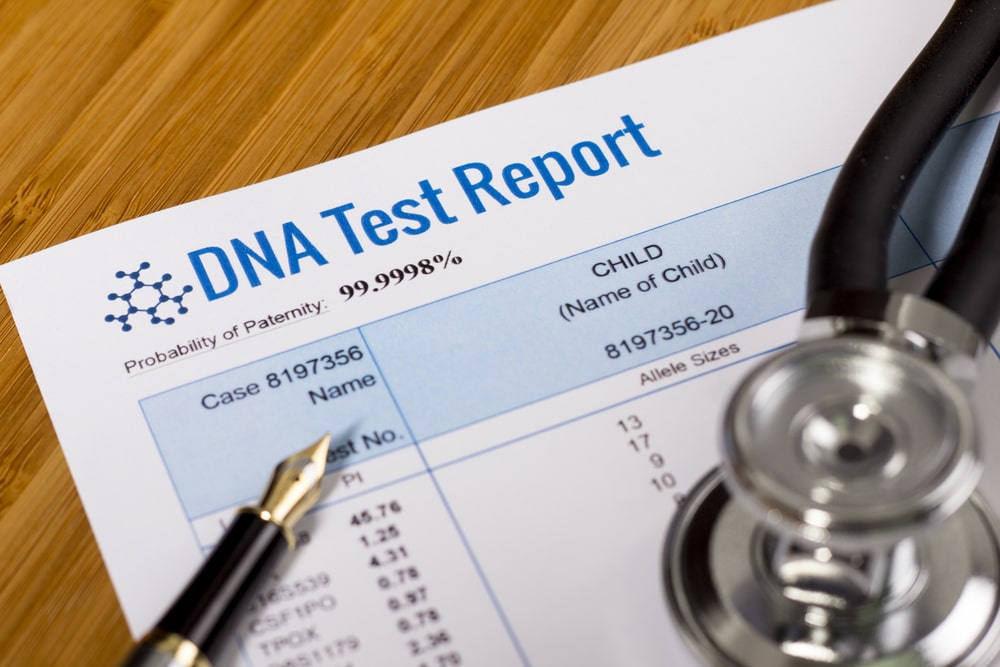Pregnancy can be a stressful and anxious time for some expectant moms-to-be. While having a baby is an extremely exciting time for many families, the nine months leading up to a child’s birth can be challenging and worrisome for others.
Not knowing who the father of their baby is can cause a mom-to-be endless anxiety and can result in her pregnancy not being the joyous and exciting occasion she had hoped for.
While it is common knowledge that DNA testing can be performed after a baby is born, there are many pregnant women wanting to know if they can have a paternity test while pregnant.
Why Get A Paternity Test During Pregnancy?
There are several reasons why a woman may ask her gynecologist about paternity testing during pregnancy. Not knowing who the father of their child is can cause excessive worry during a time when women need to be as calm and relaxed as possible.
For victims of sexual assault, discovering who the biological father of their unborn baby is can play a key role in how they process and move forward from their trauma.
If a woman has cheated on her spouse she may wish to discover the true paternity of her child before revealing her pregnancy to friends and family.
Moms-to-be may need to know who the biological father of their baby is during the pregnancy so they can begin arranging custody and child support payments with the correct man.
Knowing who the biological father of their baby is during the pregnancy can help moms organize who they want at the birth. They can also start organizing their home life and relationships before the baby arrives and life gets more busy and chaotic.
Also, knowing the paternity of a baby means the child will have accurate records of their family health history and any risk of hereditary illnesses and diseases can be passed on to the relevant health professionals.
Waiting until the baby is born before doing a DNA test may be satisfactory for many mothers but there are women who need the peace of mind of knowing who their baby’s father is as soon as possible.
View in gallery
Can You Get a Paternity Test During Pregnancy?
The simple answer to this question is yes, you can get a paternity test during pregnancy. There are a few different options for DNA testing when pregnant, each has its own risks and benefits for expectant mothers to consider.
Currently, there are three methods of prenatal paternity tests performed in America: NIPP, amniocentesis, and chronic villus sampling.
Methods Of Paternity Testing During Pregnancy.
NIPP
NIPP stands for Non-Invasive Prenatal Paternity and this DNA test can be performed from 8 weeks after a pregnancy is confirmed. The NIPP test is a blood test and does not pose a risk to the unborn baby.
The NIPP test is performed by taking blood from the mom-to-be and cheek swabs from the possible father. By comparing the two samples, a fetal cell can be constructed.
If the fetal cell resembles those already in the mother’s bloodstream then the man whose blood was taken has a 99% chance of being the child’s biological father.
Amniocentesis
Amniocentesis is an invasive method of paternity testing during pregnancy. Unlike NIPP testing, Amniocentesis is more than just a blood test and has risks to the pregnancy.
An amniocentesis test can be performed between 14 and 20 weeks of pregnancy; amniocentesis is the same test that is used for detecting chromosome abnormalities, genetic disorders, and neural tube defects.
This prenatal paternity test is performed by a doctor inserting a long thin needle through a mother’s abdomen and taking a sample of amniotic fluid from around the baby.
The DNA from the sample is then compared to the DNA sample provided by the potential father and the results are 99% accurate. There are risks to the fetus that mothers should be aware of before committing to an amniocentesis paternity test.
The test in some cases can cause early labor to be triggered, cause waters to break, or result in an infection – all of which can increase the risk of a mother having a miscarriage.
There are also some side effects to the procedure: vaginal bleeding, leaking amniotic fluid, pain, and irritation at the injection site along with abdominal cramps.
Chronic Villus Sampling
View in gallery
The third type of pregnancy paternity test available in the US is chronic villus sampling. This is another invasive method of paternity testing and involves a long thin needle being inserted into the vagina and through the cervix.
The Doctor uses the needle to collect tissue samples from the uterine wall. An ultrasound is used for accuracy and to reduce the risk of the needle touching the baby.
The small pieces of tissue are called Chronic Villi and the DNA found in the sample will be compared to that of the potential father. Like the previous two tests, Chronic Villus Sampling paternity testing provides 99% accurate prenatal DNA testing.
Expectant mothers should be aware that like an Amniocentesis test, there is a risk of miscarriage as a result of the procedure. 1 in every 100 Chronis Villus Sampling tests causes a miscarriage and this is an important fact moms-to-be need to consider before going ahead with the test.
This paternity test can be performed between 10 and 13weeks of pregnancy and can only be performed for DNA purposes with the permission of a Doctor. Chronic Villus Sampling is also used to detect certain defects, abnormalities, and disorders.
Where Can I Get a Paternity Test While Pregnant?
Expectant mothers can discuss the question of paternity with their Ob/Gyn during their prenatal appointments. The Ob/Gyn can then discuss all of the options for paternity testing during pregnancy with the mom-to-be and can organize when and which type of prenatal test the mother wishes to have done.
Amniocentesis and Chronic Villus Sampling tests will need to be performed by a physician. It is important to note that these tests when performed for paternity purposes are rarely covered by health insurance and are often expensive.
In certain situations, these tests may not be performed without a court order and there are important legal paperwork and consent forms that will need to be signed.
Invasive prenatal paternity testing can only be performed by a qualified health professional, unlike the noninvasive method of DNA testing which can be done from home.
Moms-to-be wanting a NIPP test can use companies like DNA Diagnostics Center to collect the DNA samples and perform the test for paternity.
DNA Diagnostics Center schedules the sample collection at a local facility, the samples are then sent for analysis, and results can be expected back within 7 working days or less.
Alphabiolabs is another company that performs NIPP tests, promising DNA results will be received within 7 working days.
Parents questioning their baby’s paternity can order prenatal paternity tests online and perform the cheek swab tests at home, seeing a phlebotomist in order to retrieve the required blood sample from the mother.
For parents seeking extra peace of mind about the analysis of their DNA samples, a list of labs that are accredited by the AABB can be found on the AABB website.
The Final Thought
Paternity testing during pregnancy is possible and moms-to-be can discuss all of their DNA testing options with their Ob/Gyn who will be able to advise them on what steps to take next.
Whilst waiting for the baby to arrive may be the best option for some families, paternity testing during pregnancy is available for those who want to find out the true identity of their baby’s father while they are still pregnant.






